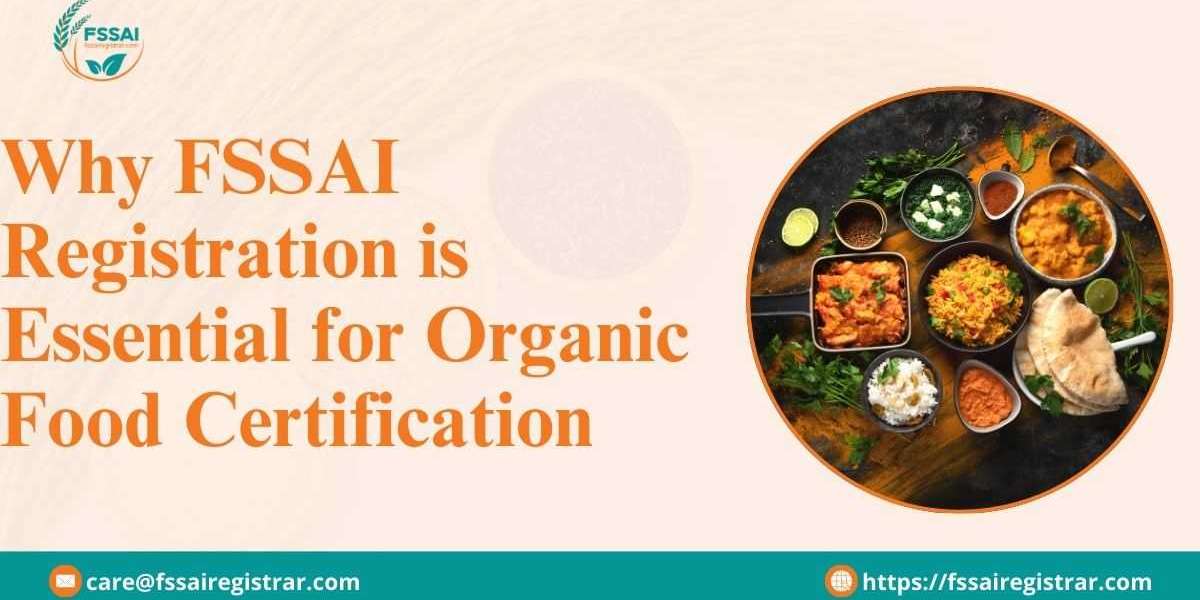The organic food industry has been growing rapidly, driven by increasing consumer awareness of health and sustainability. People are becoming more conscious about what they eat and how their food is produced. In this scenario, ensuring the authenticity and safety of organic food is crucial. The Food Safety and Standards Authority of India (FSSAI) plays a key role in regulating and certifying food products, including organic food. FSSAI registration is essential for organic food certification as it ensures compliance with food safety standards, boosts consumer confidence and provides legal credibility to organic food businesses.
Understanding FSSAI Registration
FSSAI registration is a mandatory requirement for all food businesses in India. It ensures that food products meet safety standards and are fit for human consumption. The FSSAI operates under the Food Safety and Standards Act, of 2006, which consolidates various food-related regulations in the country. Organic food businesses, whether small-scale or large-scale, need to obtain FSSAI registration to legally operate and market their products.
The Importance of Organic Food Certification
Organic food certification is necessary to differentiate organic products from conventionally grown food. It involves strict adherence to organic farming methods, the prohibition of synthetic fertilizers and pesticides, and sustainable agricultural practices. The certification process includes inspection, testing, and compliance with organic standards. Without proper certification, businesses cannot legally label their products as organic, leading to a loss of credibility and potential legal action.
How FSSAI Registration Supports Organic Food Certification
Ensures Compliance with Safety Standards
FSSAI registration mandates food safety protocols, ensuring that organic food is produced, processed, and stored under hygienic conditions. This minimizes contamination risks and ensures the highest quality of organic food reaches consumers.
Authenticity and Credibility
With numerous fraudulent organic claims in the market, FSSAI registration provides authenticity to organic food products. It assures consumers that the food they are purchasing is genuinely organic and complies with national safety standards.
Legal Requirement for Organic Food Businesses
According to FSSAI regulations, any business dealing in organic food must obtain an FSSAI license. Failure to do so can lead to legal consequences, including penalties and business shutdowns. Registration ensures businesses operate within legal boundaries and maintain ethical practices.
Consumer Trust and Brand Reputation
Consumers are more likely to trust brands that have proper certifications. FSSAI registration enhances brand reputation by showing commitment to quality and safety. It also boosts consumer confidence, leading to increased sales and market presence.
Facilitates Market Expansion
Businesses with FSSAI certification can expand their market reach, both nationally and internationally. Many retailers and e-commerce platforms require FSSAI registration before allowing organic food brands to sell on their platforms. This certification helps businesses tap into larger markets and grow their brand.
Harmonization with Jaivik Bharat and Other Organic Certifications
FSSAI registration aligns with the Jaivik Bharat initiative, which promotes organic food in India. It works in conjunction with other organic certifications like PGS-India and NPOP (National Programme for Organic Production), ensuring a seamless certification process for organic food businesses.
Regulatory Oversight and Consumer Protection
FSSAI conducts regular inspections, sampling, and testing to ensure that organic food products adhere to safety norms. This regulatory oversight helps protect consumers from adulterated and misbranded organic products, thereby maintaining market integrity.
The Process of Obtaining FSSAI Registration for Organic Food
- Visit Website – Open the official FSSAI registration portal.
- Fill Application Form – Enter your name, business details, and food category, and upload your PAN card.
- Review Submit – Check all details and submit the form.
- Pay Fee – Complete the payment online as per your license type.
- Verify OTP – Enter the OTP sent to your registered mobile or email.
- Inspection (If Required) – Officials may inspect your premises for approval.
- Get an FSSAI License – Once approved, download your FSSAI license from the website.
Challenges in Obtaining FSSAI Registration for Organic Food Businesses
- Strict Regulatory Requirements Compliance with FSSAI standards requires maintaining detailed records of sourcing, production, and processing, which can be challenging for small-scale farmers and businesses.
- High Costs for Testing and Certification The cost of laboratory testing and certification may be high, especially for startups and small businesses. However, these costs are essential investments for ensuring food safety and consumer trust.
- Complexity in Coordinating with Multiple Certifications Organic food businesses often need multiple certifications, such as NPOP, PGS-India, and Jaivik Bharat, in addition to FSSAI registration. Navigating these regulatory requirements can be complex and time-consuming.
Suggested read:- Renewing and upgrading your FSSAI License
Conclusion
FSSAI registration is a crucial step for organic food certification in India. It ensures that organic food products meet safety and quality standards, assuring consumers and regulatory authorities. By obtaining FSSAI registration, organic food businesses can gain legal recognition, build consumer trust, and expand their market reach. Despite the challenges, compliance with FSSAI regulations enhances the credibility and growth prospects of organic food brands, ultimately contributing to a safer and more transparent food ecosystem.







